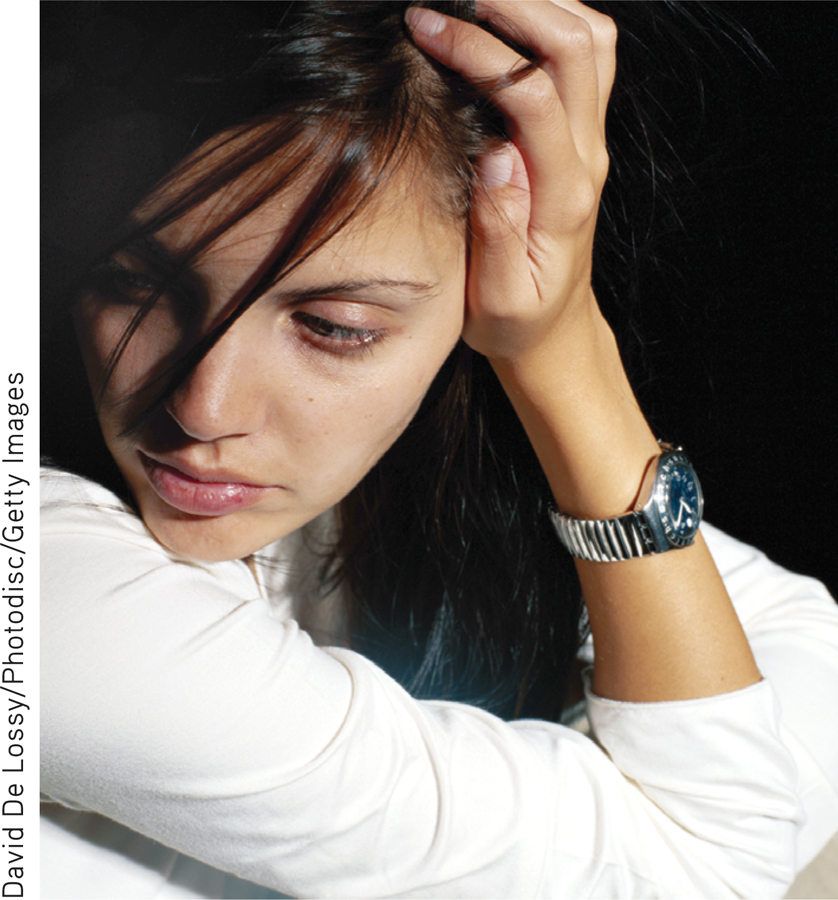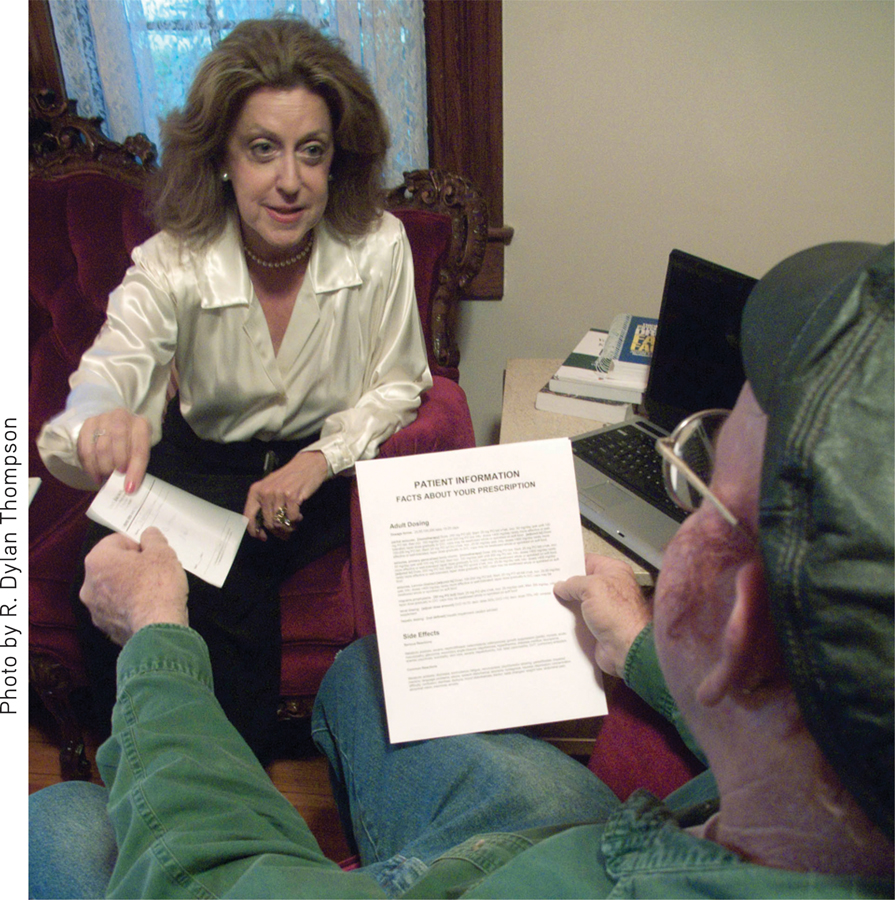15.1 INTRODUCTION: Psychotherapy and Biomedical Therapy
KEY THEME
Two forms of therapy are used to treat psychological disorders and personal problems—psychotherapy and the biomedical therapies.
KEY QUESTIONS
What is psychotherapy, and what is its basic assumption?
What is biomedical therapy, and how does it differ from psychotherapy?
People seek help from mental health professionals for a variety of reasons. Like Marcia, many people seek help because they are suffering from some form of a psychological disorder—troubling thoughts, feelings, or behaviors that cause psychological discomfort or interfere with a person’s ability to function.
But not everyone who seeks professional help is suffering from a psychological disorder. Many people seek help in dealing with troubled relationships, such as parent–
In this chapter, we’ll look at the two broad forms of therapy that mental health professionals use to help people: psychotherapy and biomedical therapy. Psychotherapy refers to the use of psychological techniques to treat emotional, behavioral, and interpersonal problems. While there are many different types of psychotherapy, they all share the assumption that psychological factors play a significant role in a person’s troubling feelings, behaviors, or relationships. TABLE 15.1 summarizes the diverse range of mental health professionals who use psychotherapy techniques to help people.
psychotherapy
The treatment of emotional, behavioral, and interpersonal problems through the use of psychological techniques designed to encourage understanding of problems and modify troubling feelings, behaviors, or relationships.
Who’s Who Among Mental Health Professionals
| Clinical psychologist | Holds an academic doctorate (Ph.D., Psy.D., or Ed.D.) and is required to be licensed to practice. Assesses and treats mental, emotional, and behavioral disorders. Has expertise in psychological testing and evaluation, diagnosis, psychotherapy, research, and prevention of mental and emotional disorders. May work in private practice, hospitals, or community mental health centers. |
| Counseling psychologist | Holds an academic doctorate and must be licensed to practice. Assesses and treats mental, emotional, and behavioral problems and disorders, but usually disorders that are of lesser severity. The distinction between clinical psychologists and counseling psychologists, however, has decreased over the years. |
| Psychiatrist | Holds a medical degree (M.D. or D.O.) and is required to be licensed to practice. Has expertise in the diagnosis, treatment, and prevention of mental and emotional disorders. Often has training in psychotherapy. May prescribe medications, electroconvulsive therapy, or other medical procedures. |
| Psychoanalyst | Usually a psychiatrist or clinical psychologist who has received additional training in the specific techniques of psychoanalysis, the form of psychotherapy originated by Sigmund Freud. |
| Licensed professional counselor | Holds at least a master’s degree in counseling, with extensive supervised training in assessment, counseling, and therapy techniques. May be certified in specialty areas. Most states require licensure or certification. |
| Psychiatric social worker | Holds a master’s degree in social work (M.S.W.). Training includes an internship in a social service agency or mental health center. Most states require certification or licensing. May or may not have training in psychotherapy. |
| Marriage and family therapist | Usually holds a master’s degree, with extensive supervised experience in couple or family therapy. May also have training in individual therapy. Many states require licensing. |
| Psychiatric nurse | Holds an R.N. degree and has selected psychiatry or mental health nursing as a specialty area. Typically works in a hospital psychiatric unit or in a community mental health center. May or may not have training in psychotherapy. |

In contrast to psychotherapy, the biomedical therapies involve the use of medication or other medical treatments to treat the symptoms associated with psychological disorders. Drugs that are used to treat psychological or mental disorders are termed psychotropic medications. The biomedical therapies are based on the assumption that the symptoms of many psychological disorders involve biological factors, such as abnormal brain chemistry. As we saw in Chapter 14, the involvement of biological factors in many psychological disorders is well documented. Treating psychological disorders with a combination of psychotherapy and biomedical therapy, especially psychotropic medications, has become increasingly common (Cuijpers & others, 2009; Sudak, 2011). Until very recently, only licensed physicians were legally allowed to prescribe psychotropic medications.
biomedical therapies
The use of medications, electroconvulsive therapy, or other medical treatments to treat the symptoms associated with psychological disorders.
However, that tradition may be changing. Since the 1990s, a movement to allow specially trained psychologists to prescribe has achieved some success. It began with the U.S. Department of Defense conducting a successful pilot program in which 10 military psychologists were given intensive training in prescribing psychotropic medications to treat psychological disorders (Ax & others, 2008). The success of the Department of Defense program was one of the factors that persuaded New Mexico and Louisiana lawmakers to enact legislation that permitted licensed psychologists to acquire additional training to prescribe psychotropic medications.
MYTH !lhtriangle! SCIENCE
Is it true that psychologists are never allowed to prescribe medications?

At this time, only a limited number of psychologists are able to prescribe medications. However, an increasing number of clinical psychologists are involved in medication treatment decisions or have clients who are taking psychotropic medications. Recognizing this trend, the American Psychological Association (2011) released new guidelines for psychologists regarding prescription medications. Among other points, the guidelines stress that psychologists who are involved in medication decisions should educate themselves about potential benefits and side effects of any medication. Psychologists are also urged to adopt a biopsychosocial approach to treatment, in which they consider psychological and social aspects of each case.
Not all psychologists favor the idea of extending prescription privileges to qualified psychologists (see Heiby, 2010; Heiby & others, 2004). Some argue that clinical psychologists should focus on what they do best: providing psychological interventions and treatments that help people acquire more effective patterns of thinking and behaving. Others are concerned that the safety and well-being of patients could be at risk if psychologists receive inadequate training to prescribe psychotropic medications (Lavoie & Barone, 2006).
We’ll begin this chapter by surveying some of the most influential approaches in psychotherapy: psychoanalytic, humanistic, behavioral, and cognitive. Each approach is based on different assumptions about the underlying causes of psychological problems. And each approach uses different strategies to produce beneficial changes in the way a person thinks, feels, and behaves—the ultimate goal of all forms of psychotherapy. After discussing the effectiveness of psychotherapy, we’ll look at the most commonly used biomedical treatments for psychological disorders.